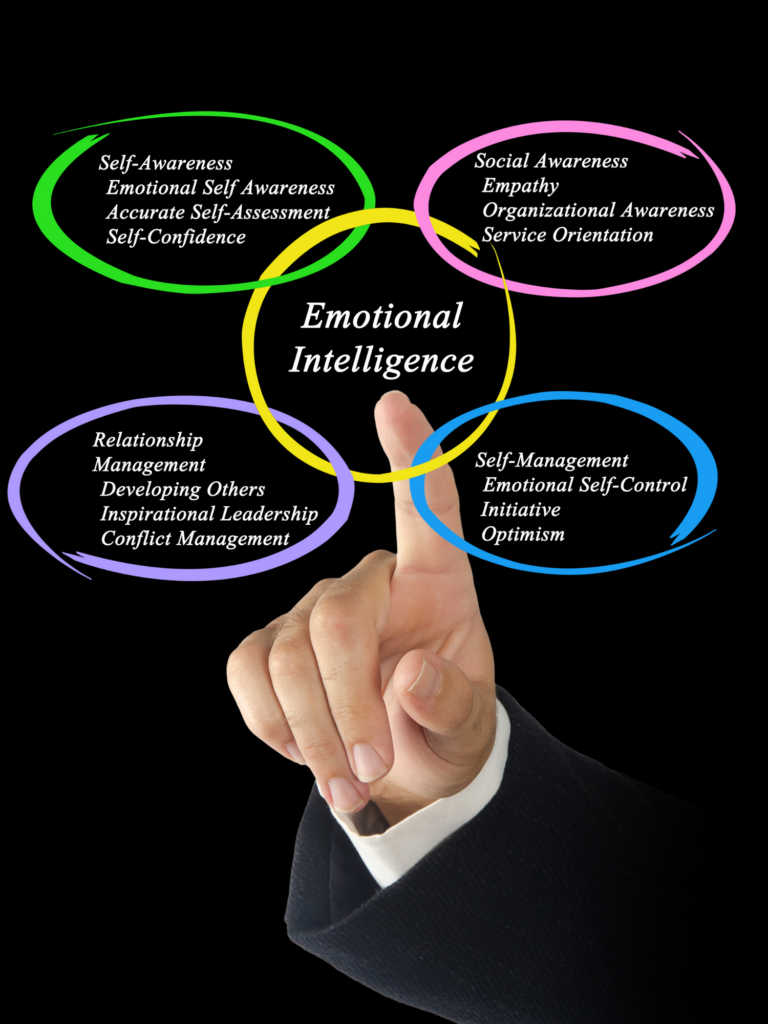What is emotional intelligence? Surely, you’ve heard it mentioned. It’s that not so new catch phrase in the hiring process that everyone is looking for, right? When people ask me to sum it up in one minute I tell them it’s that pause you take in an emergency before you speak your mind; that breath you take while you count to 10 before you say something you might regret. Actually, that is self-regulation. Emotional intelligence is much more than that.
Emotional intelligence leads to healthier relationships, because you excel at communication. It helps you to understand the value of people. It is your willingness to see things from others’ point of view and find common ground. It is connecting, and connecting increases influence.
So, again, what is Emotional Intelligence? For many, Emotional intelligence can be broken down into five factors, of which self-regulation is only the first. The others are motivation, empathy, self-awareness, and social skills. We’ve already talked about self-regulation and what that is in relation to emotional intelligence. It’s that pause you take. It’s being able to control yourself. Motivation is your ability to fire yourself up. Empathy asks can you relate to other people? Self-awareness means not only that you are aware of who you are, but also of how you communicate and how you show up. Social skills refers to how others see you.
Peter Salavey and John Mayer published groundbreaking work on emotional intelligence. They described it as two things. First, it is the ability to identify, understand and manage your own emotions. That is how are you showing up in conflict? That’s the self-regulation, self-awareness and social skills discussed above. Secondly, they said it is the ability to identify, understand and influence other people’s emotions. Now full-stop! This is not manipulation! This is whether or not you have the influence to make them feel comfortable, the ability to show empathy. Can you support them, and serve them?
Why would you want to have this? Why is emotional intelligence, often called EQ (seldom EI), important? Well, EQ impacts every area of your life. It affects business, communication, health, relationships and success. People with high emotional intelligence are 12X more productive. The have less stress, both at home, and at work. They have wider, stronger networks of relationships. During COVID, this was extremely important. Okay, it’s important anytime, but I think you know what I mean. Furthermore, in the workplace, if you have someone with high EQ and average IQ vs someone with high IQ and average EQ, the high EQ wins every time!
The cool thing about Emotional Intelligence, is that you can learn it. It’s much more plastic than IQ. It is being taught at more than 75% of Fortune 500 companies, but it isn’t being taught in Healthcare. Well, unless you know of some exceptions-it isn’t being widely taught. You can improve with training at any age.
So, how do you learn this? Learning Emotional Intelligence requires studying, exploring and understanding other perspectives. This is exactly what I teach in my coaching. First, you learn about your personality type, then you learn about the personality type, or code, of those around you. You learn the codes of those closest to you, such as family members and coworkers. You use this information to build stronger relationships and improve communications. It builds a bridge that allows you to see things from their perspective, or their point of view. You then build outward, and do the same thing with other colleagues, people you work with, but not as closely, customers, clients. Eventually, you’re doing this with the people you have friction with, using it to for conflict resolution. You find yourself using it on the fly in stressful situations.
These are skills that I teach with my coaching. I also have an online coures on EQ. If you’d like more information, email me, or set up a consultation.


